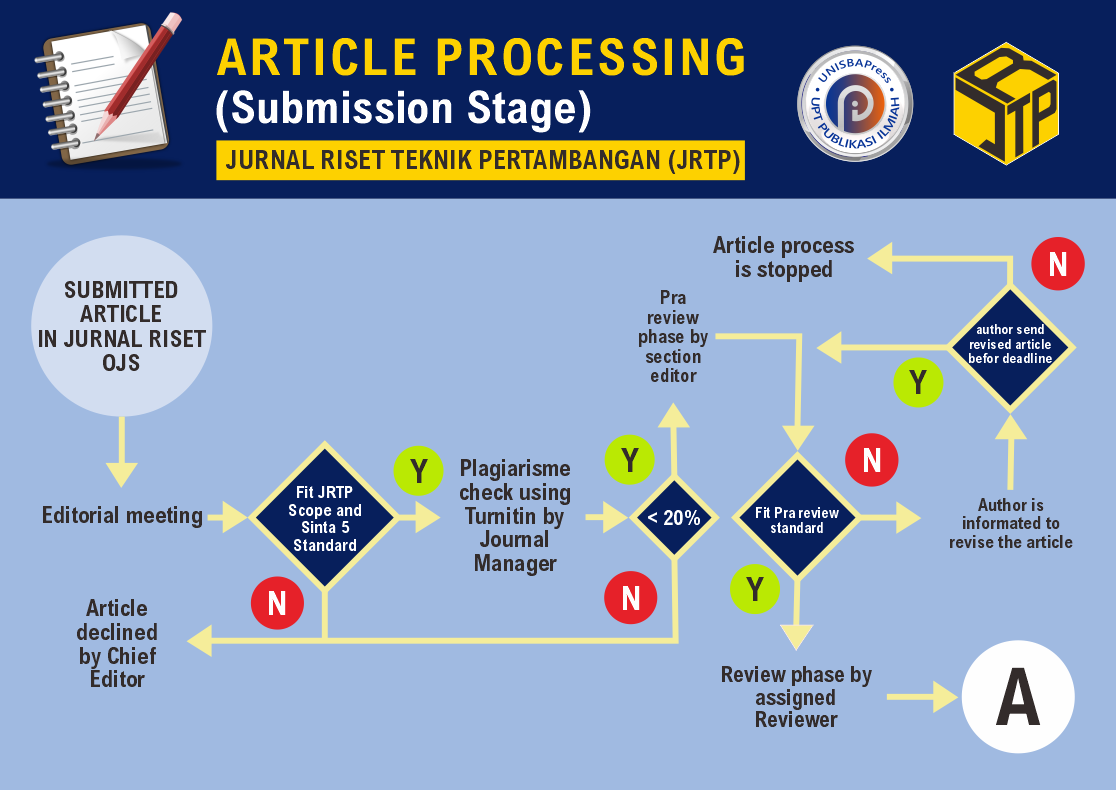Kajian Geometri Jalan Tambang berdasarkan AASHTO dan Kepmen No. 1827/K/30/Mem/2018 pada Penambangan Andesit di PT XYZ, Kecamatan Rumpin, Kabupaten Bogor, Provinsi Jawa Barat
DOI:
https://doi.org/10.29313/jrtp.v1i2.403Keywords:
AASHTO, Waktu Edar, Geometri JalanAbstract
Abstract. This study discusses the influence of mining road conditions on the circulation time of the conveyance and the work efficiency of the loading equipment. In this study, the study of mine road geometry refers to the theory of AASHTO (American Association of State Highway and Transportation Officials) in 1993 and Ministerial Decree No. 1827/K/30/MEM/2018. The geometry of the road includes the width of the road in straight conditions, the width of the road in bend conditions, the radius of the bend, the road slope (Grade), cross slope (Cross slope), superelevation, the actual rimpull calculation which is compared with theoretical calculations based on AASHTO theory (American Association of State Highways and Transportation Officials).The study of road geometry is associated with the production of digging and loading equipment to increase andesite mining production. The production observation area is carried out on the work front which is on bench 9 to the hopper, the results of observations in actual conditions are calculated and then compared with the results of theoretical calculations. In the observation area, the width of the straight road has varying values ranging from 8.12 meters to 21.60 meters, then the width of the road with bend conditions has a road width of 9.12 meters to 17.94 meters, while the slope of the road has a varying slope. ranging from 3.49% - 38.39% with rimpull available on conveyances from gears 1 - 7. From the results of the actual production calculation, it is less than optimal because there are several obstacles in terms of road geometry that do not meet the standards so that the transportation equipment cycle time is longer which will affect production, therefore to increase production, mining road geometry improvements are made for road segments that does not meet the standards of the theory of AASHTO (American Association of State Highway and Transportation Officials) and Kepmen No. 1827/K/30/MEM/2018.
Abstrak. Pada penelitian ini membahas terkait pengaruh kondisi jalan tambang terhadap waktu edar alat angkut dan efisiensi kerja alat muat. Pada penelitian ini untuk kajian geometri jalan tambang mengacu pada AASHTO (American Association of State Highway and Transportation Officials) tahun 1993 dan Kepmen No. 1827/K/30/MEM/2018. Geometri jalan meliputi lebar jalan kondisi lurus, lebar jalan kondisi tikungan, jari-jari tikungan, kemiringan jalan (Grade), kemiringan melintang (Cross slope), superelevasi, perhitungan rimpull secara aktual yang dibandingkan dengan perhitungan secara teoritis berdasarkan AASHTO (American Association of State Highway and Transportation Officials). Kajian geometri jalan dikaitkan dengan produksi alat gali-muat dan alat angkut untuk meningkatkan produksi penambangan andesit. Area pengamatan produksi dilakukan pada front kerja yang berada di bench 9 sampai hopper, hasil dari pengamatan dalam kondisi aktual dihitung lalu dibandingkan dengan hasil perhitungan secara teoritis. Pada area pengamatan kondisi lebar jalan lurus memiliki nilai bervariasi mulai dari 8,12 meter sampai 21,60 meter, lalu untuk lebar jalan dengan kondisi tikungan memiliki lebar jalan sebesar 9,12 meter sampai 17,94 meter, sedangkan untuk kemiringan jalan memiliki kemiringan bervariasi mulai dari 3,49% - 38,39%. Dengan rimpull tersedia pada alat angkut dari gear 1 - 7. Dari hasil perhitungan secara aktual tersebut kurang maksimal karena adanya beberapa hambatan dari segi geometri jalan yang belum memenuhi standar sehingga waktu edar alat angkut semakin lama yang nantinya akan berpengaruh terhadap produksi, oleh karena itu untuk meningkatkan produksi dilakukan perbaikan geometri jalan tambang untuk segmen jalan yang belum memenuhi standar dari AASHTO (American Association of State Highway and Transportation Officials) dan Kepmen No. 1827/K/30/MEM/2018.













